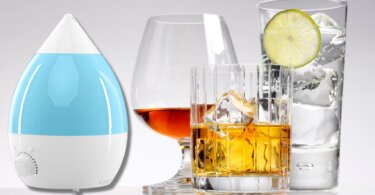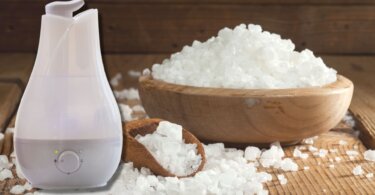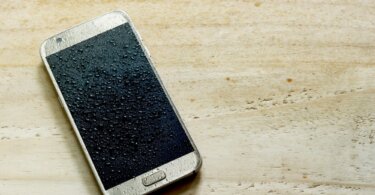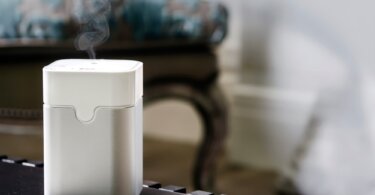So you’ve got yourself a humidifier, and you’re ready to combat dry winter air and re-moisturize your skin. You grab the humidifier’s tank and fill it full of tap water, so it can benefit your overall health. Or will it?
Tap water in a humidifier, while still a viable option, isn’t the best idea. Why? Let’s jump in and find out. We’ll also discuss what kind of water and temperature is suitable for a humidifier, so read on.

Is It Bad to Use Tap Water in a Humidifier?
The short answer? Yes. Adding tap water in a humidifier is not a smart move. Sure, your humidifier won’t instantly go haywire if you do use it, but in the long term, this can damage not only the machine but also your health.
The water in your tap has lots of minerals, including calcium, magnesium, sodium, and much more. They’re added to make the water tasty and healthy, aiding in your bodily functions.
However, when you use tap water in a humidifier, it forms mineral deposits in the tank and the filter. Over time, it builds up and clogs your machine, leading to malfunctions.
Moreover, tap water often contains bacteria and other unwanted creatures, depending on where you live. So when you add it to your humidifier, it transfers all these microbes into the indoor air, posing health hazards like breathing issues, especially in children.
Also read: Best Water Bottle Humidifiers
What Is the Best Water for a Humidifier?
If not tap water, what should you use? You want water that’s free from minerals, bacteria, and viruses. Only distilled water ticks all of these boxes, and is perfectly safe for humidifying the air. But if you’re wondering about other options and their impacts on your humidifier, here are all the details.
Distilled Water
Let’s start with why this kind of water is best for your humidifier. Distilled water is basically steam. Water is boiled to its steaming point, and this steam is then cooled back to liquid form and collected separately.
What’s left behind? Minerals, bacteria, viruses, and other gross stuff. Because of its purity, distilled water is often used in laboratories, medical equipment, etc. Hence, it makes sense to use it in your humidifier to get the purest form of moisture in your air, right?
Purified Water
This kind of water is almost the same as distilled water, the difference lying only in the way it’s purified. Where distilled water is steam-condensed, purified water goes through processes like reverse osmosis, ion exchange, etc.
Can you use it in humidifiers, though? Since it’s the same as distilled water and contains no minerals or impurities, yes, it’s safe to use it for increasing humidity levels.
Bottled Water
Normally, you’d choose bottled water for your humidifier, if not tap water. If it’s safe to drink, it must be safe to use in your humidifier, right? Not really. Bottled water contains lots of different minerals, which can quickly clog your machine.
Not only this, but multiple studies suggest that bottled water contains bacteria, often more than tap water. While using this in a humidifier may not pose a severe health risk, it’s not the best water for a humidifier, either.
Boiled Water
Boiling water gets rid of most bacteria and viruses. However, to ‘purify’ the water, you must physically remove impurities such as metal and minerals, just like in distillation, and simply boiling the water doesn’t accomplish that.
Hence, it will not help your humidifier in working smoothly.
Demineralized Water
This type of water goes through deionization, a process that removes contaminants through a filter. The result? Water is free from minerals and impurities.
While some say that it’s as pure as distilled water, whether it’s completely free from microorganisms depends on the number of processes it goes through.
One thing’s for sure, though. It has very little, and sometimes, zero minerals present in it, making it an excellent choice for humidifiers.
Do You Put Hot Or Cold Water in a Humidifier?

Now that we’ve sorted out what kind of water works well for a humidifier, let’s talk about its temperature.
Suppose you own a pretty basic humidifier – no hot or cool mists. Should you add hot or cold water in it? The answer partially depends on your preference.
Hot water can hold more moisture and produces a warm-mist, which is often helpful for colds and flu. But for some people, breathing in warm air could be uncomfortable. Moreover, hot water could potentially damage your device on the inside if it’s not built to be a warm-mist humidifier. If that’s the case, read my article about why is my humidifier not working?
Also, hot water gives way to mold and bacteria growing inside the reservoir, which will end up in the air around you. Yikes! On the other hand, using cold water in a humidifier can lower the air temperature and make it more comfortable for breathing.
Must read: What Can You Put in a Humidifier to Kill Bacteria and Mold and Best Water Bottle Humidifier
Additionally, it’s safer as pets and children won’t be at risk of tripping over a humidifier full of steam and burning themselves. Cold water also contains less dissolved minerals, unlike hot water, which is often very high in mineral content.
The bottom line? Try not to use piping hot water in your humidifiers.
Plus, if you own either a warm or cool-mist humidifier, you won’t have to worry about water temperature anyway. This is because these machines adjust the temperature of the water themselves. For instance, a warm-mist humidifier first heats the water to its steaming point, before dispersing it into the air.
Hence, we suggest using water that is at room temperature for such humidifiers. Just make sure that it’s either distilled or demineralized, and you’re good to go.
Final Words
Humidifiers can be invaluable for anyone living in a dry climate. However, good quality humidifiers are often expensive and have high repair costs.
If not maintained, you’ll find that your humidifier isn’t working as effectively anymore, and in some cases, lime and mineral deposits can stop the humidifier from working altogether.
With that said, you should always maintain your humidifiers by using the right kind of water in them and descaling when necessary. If you happen to live in an area where tap water has high mineral content, it’s better to switch to distilled or mineral-free water for your humidifier.




